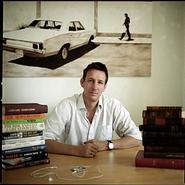
Asle Toje, acting research director for the Norwegian Nobel Institute, visited Hamilton on March 8 to discuss the history of the Nobel Peace Prize and its most recent recipient, the European Union. As research director Toje is responsible for gathering information on Nobel candidates for review by the Nobel committee.
Toje began his lecture talking about the history of the Nobel Peace Prize and its creator, the inventor Alfred Nobel. Nobel came from very humble origins but earned a fortune when he invented dynamite. He used this wealth to set up prizes in Chemistry, Physics, Medicine, Literature and Peace. The Peace Prize was at the heart of what Toje described as, “an emerging international peace movement.”
Toje believes that the budding peace movement of Nobel’s time has since enveloped the world. He points out that, “humanity has never had it better. Since the end of the Cold War… wars and casualties have grown fewer, infant mortality is down, education is higher.” Most nations now see themselves as members of an international community, who foster fraternity with their neighbors. However, Toje warns that the threat of war is always looming; we must actively work to preserve peace.
Toje considers one former U.S. statesman to be a model defender against international conflict. Elihu Root, Hamilton College class of 1864, served as Secretary of War from 1899 to 1904 and Secretary of State 1905 to 1909. Toje describes, “In a time of imperialism, in a time when ‘The White Man’s Burden’
was gospel… he had a view on culture that is similar to what we have today—that is, respect different cultures.”
Root expressed this attitude via his foreign policy; he pressured other nations to follow suit. Most notably, he laid the foundations for the International Court of the Hague, which resolves disputes between nations before they become violent. For his efforts, Root was awarded the Nobel Peace Prize in 1912.
One hundred years later, in 2012, the Peace Prize was awarded to the European Union. Toje acknowledges that this decision faced harsh criticism due to Europe’s economic crisis. He explains that EU’s economic troubles have fractured the continent and the chances of complete recovery are dwindling. However, he counters, “it is not the Peace Prize for economics.”
Toje describes how European history is plagued by recurring war. He describes how, “the poison of Europe was Nationalism.” Strong national pride led to bitter feelings and often violent conflict between neighboring states; this deadly animosity erupted in both World War I and World War II. The European Union imposed a strict institutional framework over these opposing nations. It created a wider European community and regulated the once-hostile relations between its many partners.
The bureaucracy of the EU is highly influential throughout its member nations. As Toje describes, it can enforce regulations on “how much wattage can be in a light bulb to what armaments can be deployed on the battlefield.” Above all, it demands that members respect human rights, uphold the rule of law and protect free market economy. As it integrates more nations, the EU is able to protect these fundamental ideals.
For all of its benefits to world peace, Toje stresses that the EU must address its financial crisis. He identifies a host of economic problems which must be addressed within the next few years—birth rates are declining; high taxes have driven away industry; immigrants cannot succeed in the market place.
Toje also believes the European character has fundamentally changed. People are less adventurous, less entrepreneurial; innovation has all but halted. Toje warns, “we will find the innovation again, or we will return to history.”
